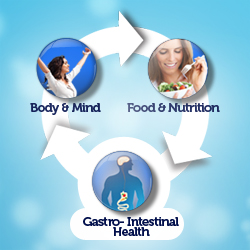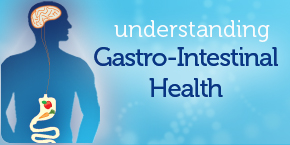Gastro-Intestinal Health
 The quality and quantity of food you consume is fundamental to your health and wellness. The nutrients in your food provide the building blocks for all your cells and organs of your body and so the expression “we are what we eat”.
The quality and quantity of food you consume is fundamental to your health and wellness. The nutrients in your food provide the building blocks for all your cells and organs of your body and so the expression “we are what we eat”.
Food contains a wide variety of nutrients and it is important that we have them in optimum amounts and in the right balance.
Nutrient excess or deficiency may affect cell, organ, body and mind function – and if prolonged lead to illness. Food also may contain harmful substances which can affect your cells, organ and so body and mind function.
All these factors highlight the importance of the food we eat.
We are all different, each person has a unique genetic makeup, constitution, lifestyle diet and environment, and so everyone has a unique health history. There is no one diet that fits all. In certain circumstances supplements may be necessary.
Nutrition is complex and can be difficult to understand.
The resources below are designed to provide knowledge, understanding, strategies and support through a holistic approach and assist you with treatment and prevention.
Gastro-intestinal function in more detail:
Mouth foodpipe & stomach
Your food is ingested, swallowed and transported down the food pipe (oesophagus) to the stomach before reaching the intestines.
Trouble with the oesophagus can give rise to symptoms and in more severe cases cause obstruction and thereby lead to weight loss and malnutrition.
Symptoms such as reflux and heart burn usually occur when the stomach contents regurgitates back into the oesophagus. These symptoms occur more with stress and weight gain. There is a link between reflux, narrowing and cancer of the oesophagus.
In the Stomach the food is partially broken down by the physical action of the movements of the stomach wall. It is also acted on by enzymes that break down the protein components of food. The enzymes are activated by the release of acid. Some people have an excess of stomach acid and some produce less.
Stomach conditions tend to cause upper abdominal discomfort, reflux and heart burn and a feeling of fullness.
You can learn more in the book:
Pancreas, liver and gall bladder
The pancreas sits across the upper part of the abdomen and through a duct releases enzymes into the upper part of the small intestine. These enzymes are an important accessory support to the digestive process. ( The pancreas also produces insulin to control our blood sugar levels).
Obesity, high alcohol intake and raised fat levels in the blood can damage the pancreas and lead to pancreatic enzyme insufficiency which may occur without symptoms until the damage to the pancreas has been extensive.
The Liver takes up, stores and activates many nutrients once they are absorbed from the intestine. The liver also detoxifies and excretes many harmful chemical substances whether they originate from within your body or the food you eat.
In people who are overweight there is a tendency to form a fatty liver. Alcohol excess can also cause a fatty liver. Damage to the liver can be extensive and commonly occurs without symptoms.
The Bile that is excreted by the liver is stored in the gallbladder. The gallbladder tends to produce stones which in turn can cause inflammation of the gall bladder wall and obstruction. The condition is more common in the overweight. It often requires surgery.
You can learn more in the book:
Small & large intestine
The food from the stomach enters the small intestine which is a long tube.
Here enzymes are released which further break down the food into small components in so they can be absorbed. Any impairment of the intestinal wall and its release of enzymes can hinder the digestion of your food and thereby its absorption.
Any food that is not digested or absorbed passes through to the large intestine where it may then be further broken down by the residing bacteria. This process is known as fermentation. The commonest substances that undergo fermentation are soluble fibres eg psyllium and sugars eg lactose & fructose. The soluble fibre once fermented by the bacteria produce chemicals called ‘short chain fatty acids’ which assist intestinal wall health. However, the sugars on fermentation produce chemicals including acids that may be harmful and even toxic.
Intestinal symptoms are common and include pain, bloating, constipation and diarrhoea. They are caused by a wide range of conditions. Because the intestine is deep inside the body, this can make a diagnosis of a medical condition difficult; especially if one just depends on patient history and a physical examination. Consequently, further investigation is often required.
Fortunately, the newer investigations such as faecal test, gastroscopy, colonoscopy and breath tests enable a diagnosis to be made in most cases.
Furthermore most conditions can be treated, especially if they are diagnosed early.
You can learn more in the book:
The Food Body Mind Connection
Body & Mind
Your body and mind are part of a holistic health picture. Symptoms such as chronic tiredness, energy depletion, depression, anxiety, hormonal, autism and child behaviour problems, high blood pressure, heart disease, diabetes and weight issues may be related to your nutrition and gastro-intestinal health.
>>Read More
Gastro-Intestinal
The above infromation gives a good understanding of how gastro-intestinal health is part of the big picture.
The other parts of the Food Body Mind Connection are >>Food & Nutrition, and >> Body & Mind.
Food & Nutrition
Your nutrition is the foundation for all the cells and organs in your body. Our health and wellness is related to the quantity and quality of the food we consume. Your nutrition plays a significant role in gastro-intestinal health and affects your body and mind. The relationship isn’t always obvious.
>>Read More





